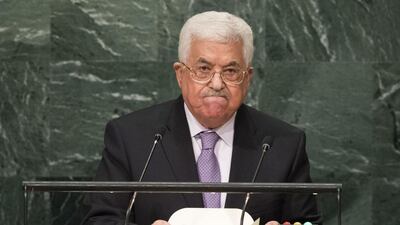NEW YORK // Britain should apologise for its 1917 declaration endorsing the founding of a Jewish homeland in Palestine and should recognise Palestine as a state, Palestinian president Mahmoud Abbas said on Thursday as his Israeli counterpart said he would “gladly” address the Palestinian parliament in Ramallah.
Speaking at the UN general assembly, Mr Abbas said the Palestinian people had suffered greatly because of the 1917 Balfour Declaration which ultimately led to the creation of the state of Israel.
“We ask Great Britain, as we approach 100 years since this infamous declaration, to draw the necessary lessons and to bear its historic, legal, political, material and moral responsibility for the consequences of this declaration, including an apology to the Palestinian people for the catastrophes, misery and injustice this declaration created and to act to rectify these disasters and remedy its consequences, including by the recognition of the state of Palestine,” president Abbas told the assembly. “This is the least Great Britain can do.”
In fact, the Balfour Declaration – named after the foreign minister at the time – said Britain approved of and would help achieve a Jewish homeland “it being clearly understood that nothing shall be done which may prejudice the civil and religious rights of existing non-Jewish communities in Palestine or the rights and political status enjoyed by Jews in any other country”.
Peace talks on the long-running conflict between Israel and Palestine stalled in 2014 and Mr Abbas, who has been Palestinian president for 11 years, said any hope of real statehood for Palestine was impossible while Israel continued to build settlements, which are universally regarded as illegal, in the occupied West Bank, and he urged all countries present to recognise Palestine as a state.
“What the Israeli government is doing in pursuit of its expansionist settlement plans will destroy whatever possibility is left for the two-state solution along the 1967 borders,” he said. “Those who believe in the two-state solution should recognise both states, and not just one of them.”
He was ready to extend the hand of peace but asked, “The question remains and persists: is there any leadership in Israel, the occupying power, that desires to make a true peace?”
Less than an hour later, it was the turn of Israeli premier Benjamin Netanyahu to address the assembly.
“This remains the true core of the conflict: the persistent Palestinian refusal to recognise the Jewish state in any boundary,” he said, directly contradicting Mr Abbas. “This conflict has never been about the settlements or about establishing a Palestinian state. It’s always been about the existence of a Jewish state, a Jewish state in any boundary,” he added.
However Mr Netanyahu conceded the settlement issue was “real” and “can and must be resolved in final negotiations, final-status negotiations”. And he invited his Palestinian counterpart to address the Israeli parliament, saying he would “gladly” speak at the Palestinian parliament in Ramallah if invited.
* Agence France-Presse

